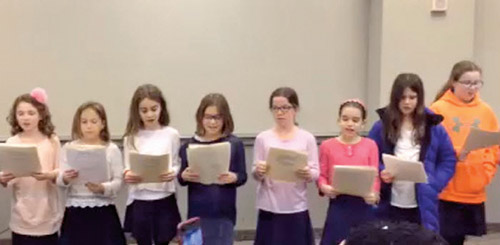

Last week, Dor L’dor of Congregation Ahavath Torah invited the Moriah choir to perform Pesach songs, in preparation for the upcoming holiday. Over the course of the year, the Moriah choir has spent time learning to understand their own personal vocal approaches in the recording studio, and has emerged as a cohesive vocal team. Since they have only performed sparingly in public, a live event is a special opportunity for the students to experience more than just the melodies they are singing. They are able to learn the story behind the songs and see their impact on others.
As they entered Ahavath Torah, the students were greeted warmly by active elders of the community, who were eagerly awaiting their presentation. They sang one tune from the Haggadah and additional tunes rich with narrative that touched upon our nation’s past, present and future.
They began with “Thankful” by Shalsheles Junior, emphasizing their gratitude to have the opportunity to sing for Dor L’dor, who teach future generations of Moriah students timeless values.
Prior to their second song, their music teacher, Rabbi Michael Nadata, asked the students a question from the sefer Naot Hadeshe, written by Harav Shmuel Avraham Borenstein of Sochatchov, to engage everyone in a ‘Seder-like’ experience. Why is it that we encourage our children to steal the afikoman, if we find stealing such a deplorable behavior? After several students shared some beautiful answers they had learned in their classrooms, Rabbi Nadata offered the Rabbi of Sochatchov’s profound response. Although our physical and spiritual existence was threatened in Mitzrayim, there was a piece of our identity, that spark inside of us, that no enemy can take. That is because our tie to the Jewish nation cannot be extricated from us through any means. Then the choir sang Yonatan Razel’s famous melodic composition to the words “Vehi Sheamda,” declaring our tenacity for survival against overwhelming odds.
The third selection, “Birchat Habanim,” was a clear declaration that the mesorah of our patriarchs and matriarchs laid the foundations of existence for future generations. The song’s sentiment, “May it be the will of our Father in heaven to imbue righteousness, awe and love of Hashem and good deeds onto our sons and daughters,” reflected the link of four generations of Judaism in one room. The final tune, “Ivri Anochi,” expressed the pride the students have in being Jewish through every circumstance of life.
After their performance, the collective nachat could be felt throughout the room. The Moriah students didn’t only exit this event prouder, but a little wiser as well.













